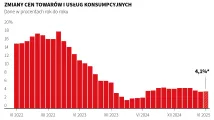Poland's further rate cuts unlikely until Q4 '25, cycle of small cuts possible, says member
The next interest rate cuts in Poland are unlikely to take place until the fourth quarter of 2025 and this would be the start of a cycle of rate cuts in small steps, Poland's Monetary Policy Council member Ireneusz Dabrowski told reporters. He added that in June, the Council would discuss reducing the interest rate on reserve requirement funds.
"I don't foresee cuts at the next meeting in June, the discussion may return in July, but it will also be a discussion rather than a decision," Dabrowski told reporters behind the scenes of a conference at Warsaw University of Economics SGH.
"Firstly, we are waiting for data on energy prices and new tariffs (...), they carry much weight. The second thing is the impact of the interest rate change - how it will affect expectations," he pointed out.
The MPC member added that the third thing that the Council will take into account is how wage pressures are to change, adding that they are slightly above the limit that the MPC would like.
"We are simply waiting for the data. (...) As far as the next decisions are concerned, I am rather talking about the fourth quarter, but at the moment I would not make a firm declaration," Dabrowski said.
He underlined that there are very many factors that will influence the MPC's decisions.
"I assume that we are waiting for the cycle to start. I assume that we have made the adjustment, and we will see what impact this adjustment will ultimately have (...) The next step is more likely to be a cycle, but when - it is difficult for me to assess; a cycle understood as a bunch of small steps," Dabrowski explained.
"I am in favour of any next adjustments being a cycle and taking place in a situation of very high confidence that we will return to the inflation target permanently," he added.
Poland's central bank NBP governor Adam Glapinski told the most recent press conference that the MPC members' statements at the May meeting indicated that if the Council decided to cut rates further in July or in autumn, the majority would be in favour of a cycle. He added that for the central bank, smaller moves of 25 basis points are more comfortable than 50 basis points adjustments.
Dabrowski was unable to say at what scale rates might change by the end of the year, as, in his view, there is too much of uncertainty.
"I won't mention global uncertainties. Today we already have a new world - there was a China-US agreement on Sunday. This will be compounded by global uncertainties. Oil is already above USD 60 per barrel," he added.
MPC's Dabrowski said that the Council will discuss lowering the interest rate on reserve requirement funds in June, but the outcome of the discussion is currently undecided.
"I don't know in what direction the discussion will go in June - rather in the direction of reducing the interest rate on the reserve requirement, but I really don’t know what the conclusion will be," he told reporters.
"We will rather talk about the interest rate than the level of the reserve requirement itself," he added.
The reserve requirement rate is currently 3.50 percent and the interest rate on reserve funds is set at the reference rate, which is 5.25 percent after the May reduction.
At the beginning of May, Poland's central bank NBP governor said that the subject of mandatory reserve parameters would appear on the agenda of the June MPC meeting.
tus/ han/ ao/


